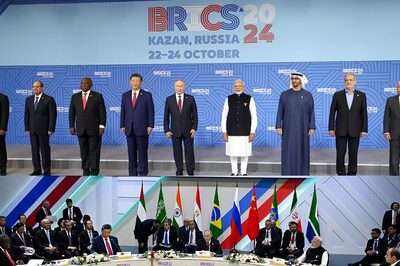
views
WASHINGTON: The U.S. Treasury will press countries to keep up coronavirus stimulus during International Monetary Fund and World Bank annual meetings next week and urge China to fully participate in debt relief for poor countries, a senior Treasury official said.
In a video interview recorded on Tuesday and published on Friday, Treasury Undersecretary for International Affairs Brent McIntosh said a strong recovery from the COVID-19 pandemic depended on continued policy support.
“We cannot declare victory at this point, we need to continue pushing for responsive measures,” McIntosh told https://www.youtube.com/watch?v=F4foW20d8Hs Mark Sobel, U.S. chairman of the Official Monetary and Financial Institutions Forum, a London-based think tank. “So I think our first message in the meetings is going to be that countries need to be not withdrawing support prematurely.”
McIntosh said in the Tuesday interview that he hoped that U.S. Treasury Secretary Steven Mnuchin and House of Representatives Speaker Nancy Pelosi could reach agreement on a new U.S. coronavirus aid package.
Finance officials from the 189 member countries of the IMF and World Bank will meet virtually next week to review the global response to the pandemic and economic recovery prospects. They will also try to negotiate further steps to strengthen debt relief to stave off default crises in poor and highly indebted countries.
IMF Managing Director Kristalina Georgieva said $12 trillion in fiscal stimulus, along with massive monetary easing, has made the outlook “less dire” than in June, but the global economy still faces a tough climb out of a pandemic-induced recession.
DEBT RELIEF FROM CHINA
McIntosh said he would press Chinese officials for “full, faithful transparent compliance” with a G20 freeze on official bilateral debt service for the world’s poorest countries implemented this year.
“China is the largest bilateral lender here. And so what we need to see from official bilateral lenders is transparency, not imposing non-disclosure agreements, not using collateralized financing.”
He said China needed to adhere to commonly agreed definitions of official bilateral creditors to include any entity “working at the behest of government,” including government ministries, development finance institutions and export credit agencies, among others.
McIntosh said the Trump administration still opposed a general allocation of new IMF Special Drawing Rights — a move akin to “printing” hundreds of billions of dollars in currency reserves for all members — because it is not a “targeted or temporary” measure.
But he said the Treasury is encouraging wealthier countries to contribute unused SDRs to an IMF fund to aid poorer countries. The Treasury is working with the White House Office of Management and Budget to determine what U.S. aid package could be offered in this area, he said.
Disclaimer: This post has been auto-published from an agency feed without any modifications to the text and has not been reviewed by an editor
Read all the Latest News and Breaking News here




















Comments
0 comment